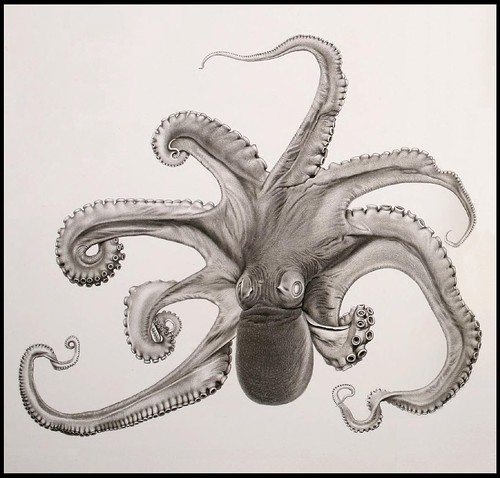I Cefalopodi!








UPDATE: The following quote relates to the author of a different volume
"Adolf Naef (1883-1949) was a Swiss zoologist and palaeontologist, famous for his work on cephalopods and systematics.
[He] studied at the University of Zurich, under the guidance of Arnold Lang, a former Professor of Jena University and close friend of Ernst Haeckel*. Naef visited and worked in Anton Dorn’s Zoological Station in Naples, Italy in 1908, studying the squid Loligo vulgaris, the subject of his dissertation.
Naef returned to the Naples Zoological Station in the mid 1920s to study cephalopods, publishing a two-part monograph in the Station’s 'Fauna und Flora des Golfes von Neapel und der Angrenzenden Meers-Abschitte' ('Fauna e Flora del Golfo di Napoli') series, which formed the basis for his two short but significant monographs on systematic theory. In 1922 he became Professor at the University of Zagreb, and in 1927 was Professor of Zoology at the University of Cairo."
'I Cefalopodi' is hosted by the Biodiversity Heritage Library on behalf of the Smithsonian Institution.
The overall series from Naples is dated 1896 (presumably when it began)
UPDATE (Sep. 2011) I am indebted to Carlo C who emailed to advise the following:
"Actually the book they are from is not monograph n.35 by Naef, but rather the 1896 monograph n.23 by Giuseppe Jatta.UPDATE II: (Sep 2011) The Biodiversity Heritage Library blog featured 'I Cefalopodi' in its Book of the Week.
The author of the magnificent color and b/w plates you posted is Comingio Merculiano (1845- 1915), a professional watercolor painter hired in 1885 by prof. Anton Dohrn as in-house illustrator for the Naples Zoological Station.
He has been one of the best scientific illustrators of all times and this book on cephalopods is probably his masterpiece."
Perhaps via; I don't quite recall. Click through on the images above to see them the right way up!

I don't think I've seen these before. They're beautiful at every size and angle!
ReplyDeletei am a sucker for this kind of thing
ReplyDeleteWonderful. Cephalopods are the shit.
ReplyDeleteAbsolutely exquisite.
ReplyDeleteAnd Lynne Rutter, I see what you did there.
The shimmering quality of the color and the fluidity of the fleshy, squishy forms are INCREDIBLE... the specimens look so alive!! These images really are masterpieces.
ReplyDeletewaw ... wonderful animal
ReplyDelete